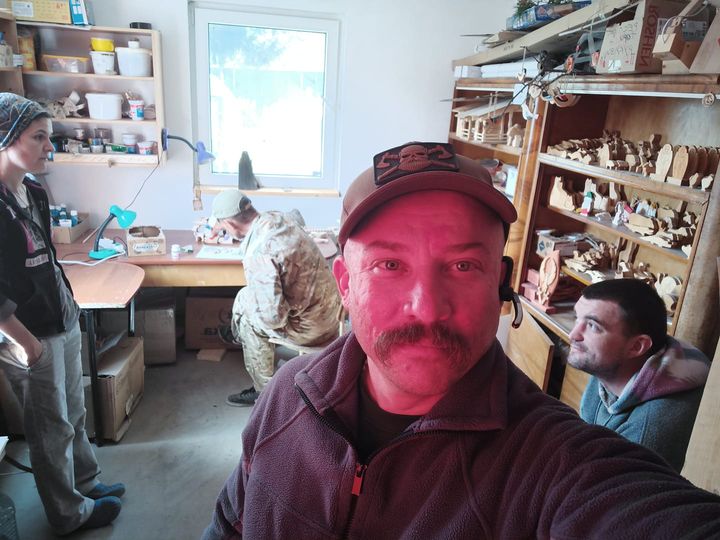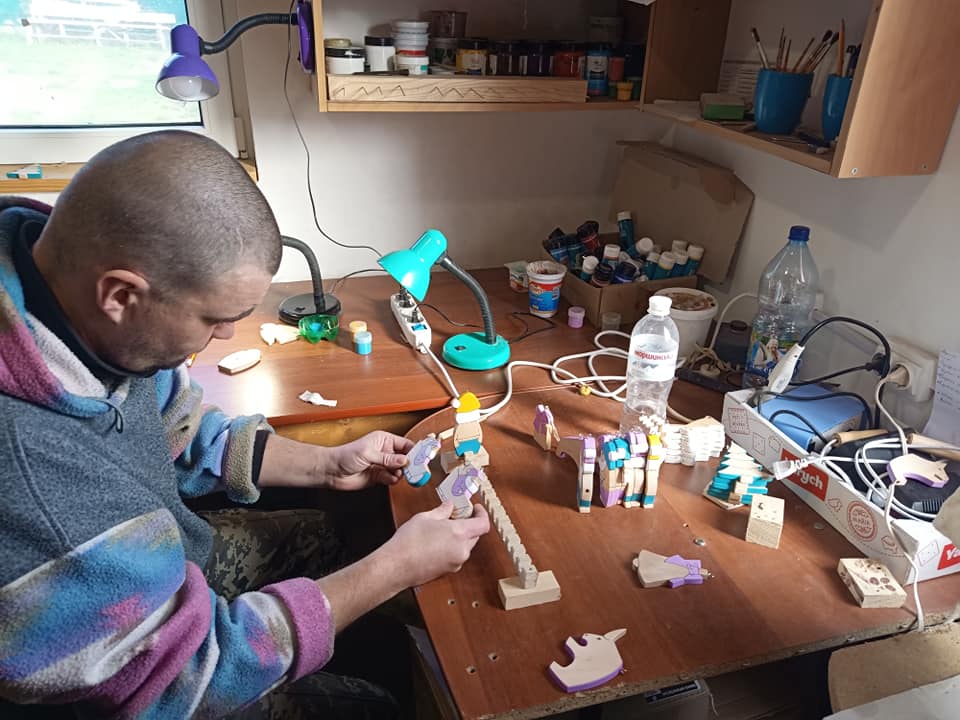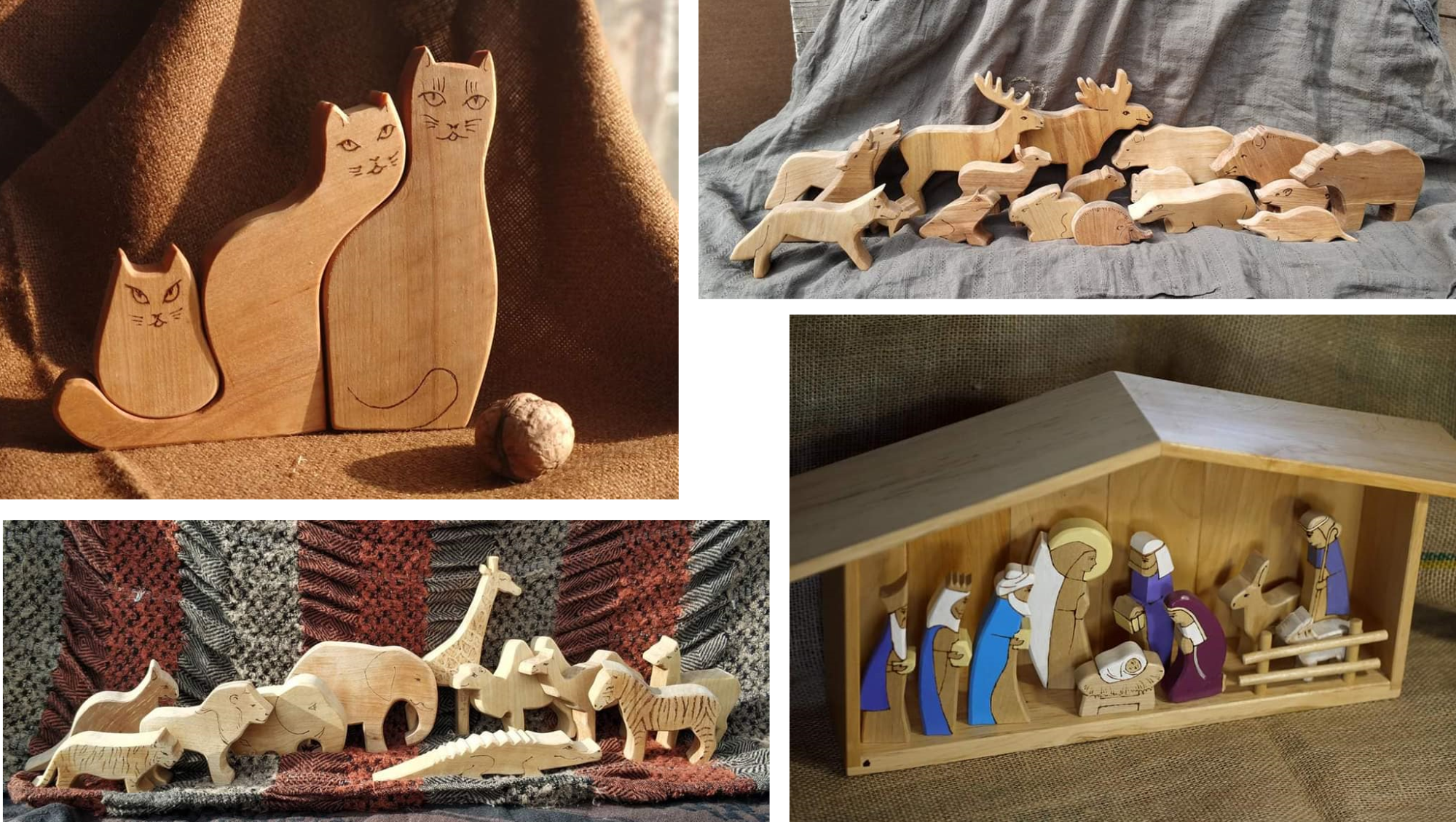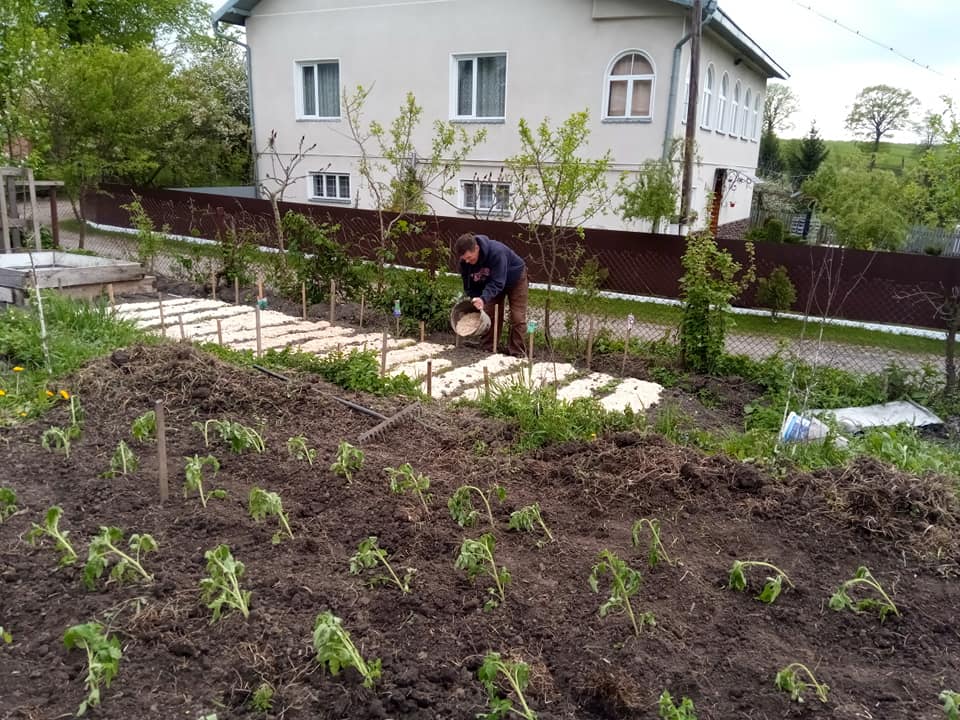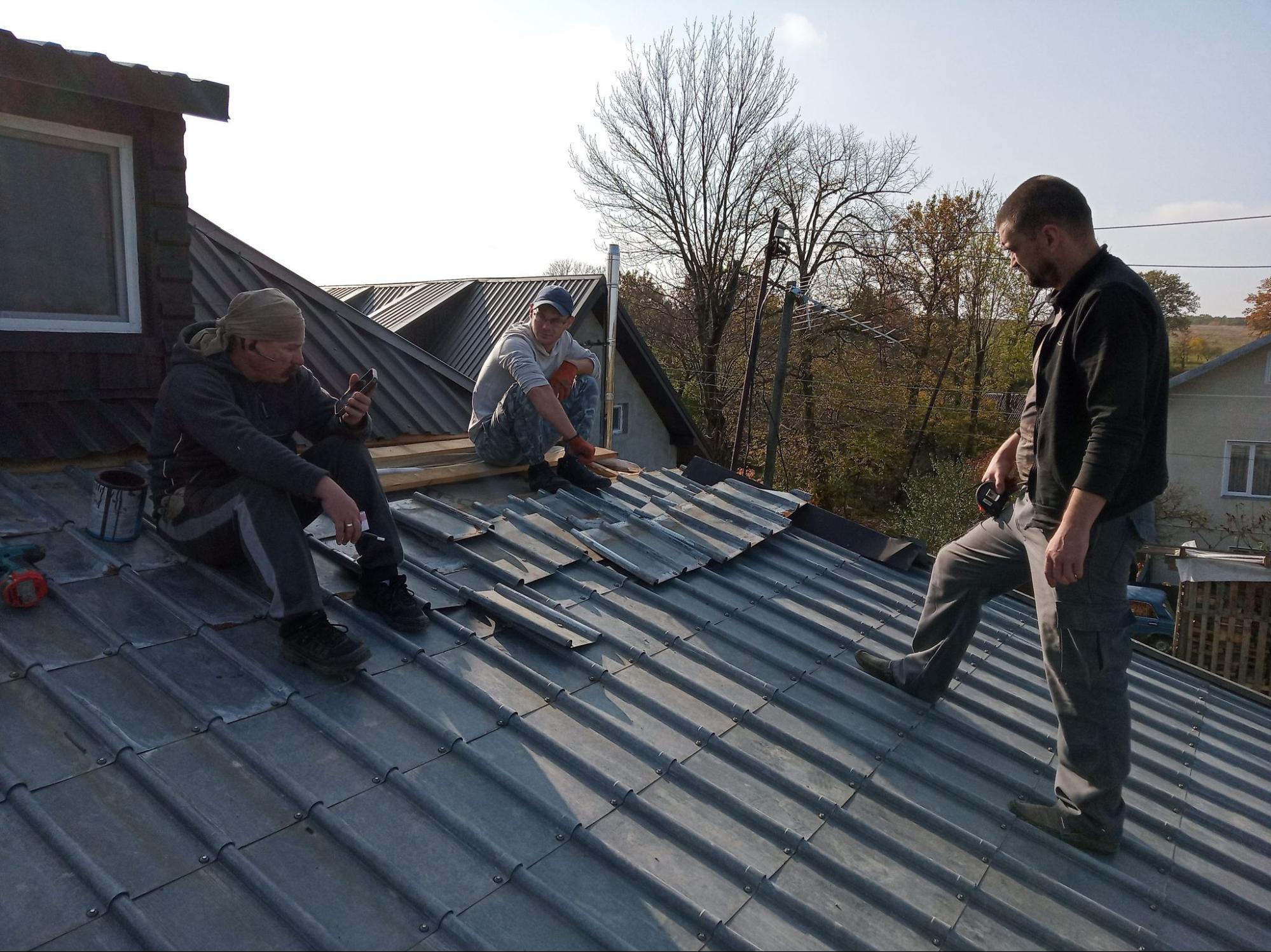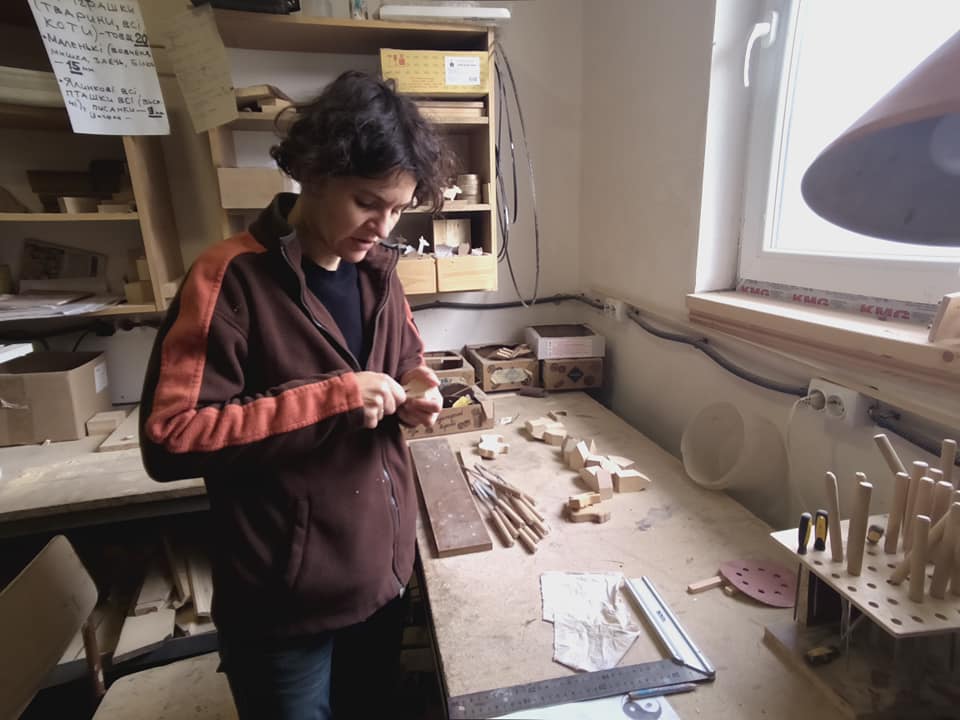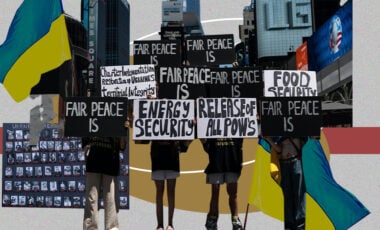What to do if state doesn't deal with veteran issue: how they help former soldiers return to life in Ivano-Frankivsk region
The "Banderivskyi Skhron" center provides veterans with psychological help and involves creating wooden toys and coffee in therapeutic work.
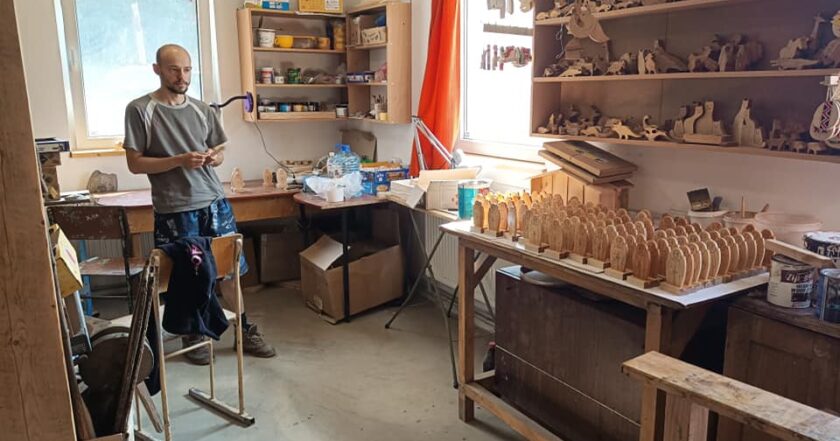
For many having gone through an actual war, it doesn't end in a peaceful land. Often ex-soldiers need help to adapt, time to realize their current situation, and strength to recover and heal.
Rehabilitation Center for the Military and Their Families "Banderivskyi Skhron" gives a chance to return to normal life to those who defended peace and our bright sky.
Ihor Chernetskyi, a volunteer and participant in the events on the Maidan and Anti-Terrorist Operation, founded the Banderivskyi Shkron Veterans' House, in the village of Klubivka in the Ivano-Frankivsk region.
During the Revolution of Dignity, Ihor, a lawyer by training, supervised the St. Michael's Hundred, was wounded and suffered a clinical death. Not fully recovered, he transported humanitarian aid to the anti-terrorist operation zone. He couldn't stand aside for a day; as soon as he got rid of crutches, he went to the front. Upon his return, he, a cavalier of the Order For Courage of III grade, together with his wife Natalia, who he met and married on Maidan, arranged a shelter for brothers, disabled by war.
Having felt the crucible of war the hard way, Ihor realized: veterans cannot do without psychological recovery centers. Since they didn't discuss the issue at the state level in 2016, he tried to arrange such a place on his own.
They first sought a shelter location near Kyiv, but rent prices for houses were simply unaffordable. The incident helped: while visiting friends together with his family in Ivano-Frankivsk, he met a local priest who offered accommodation for the future center, an abandoned house of the priest sent to Siberia during World War II. They settled on their own nickel received from the state as compensation for injuries and disabilities. According to Ihor, the shelter name was born by itself: a restored "Kryivka UPA" was nearby (skhron or kryivka is a bunker often created by the Ukrainian Liberation army – TN).
In the spring of 2017, Banderivskyi Skhron began operating permanently. During this time, over 700 veterans passed through the rehabilitation center. Some soldiers visited for a few days to switch and reboot, and some stayed for years, becoming permanent team members. It was extremely easy to work with some veterans, and sometimes they needed to impose sanctions under the veteran's contract in the rehabilitation home (there are strict rules and an indisputable "dry law" in the center).
"For stupid thoughts not to creep into your head, you need to put them to work"
In 4 years, they created two social mini-enterprises based on the Banderivskyi Skhron: "Coffee from Skhron" and "Toys from Skhron." The shelter members built the workshops on their own. Following Ihor's example, his former ward Serhii from the 11th Battalion "Kyivska Rus" transferred his monetary compensation for disability to the shelter to construct and install a carpentry shop. The Canadian Ukrainian Diaspora, the Ivano-Frankivsk Regional Administration, the Ministry of Veterans, and ordinary people who monitor the activities of the Veterans' House on social media helped with funds.
The primary task of creative workshops isn't to make a profit, but to help fighters adapt and socialize. At work, people are distracted from bad thoughts and unpleasant memories. Also, the painstaking process of making wooden toys and decor develops fine motor skills, which is very useful for traumatic brain injuries and contusions.
Ivan K. has been in Skhron for 6 months; he says, the work calms him down and puts his thoughts in order: "It's a real relaxation, it's like I have a hobby. Getting up in the morning and doing what you love is great."
Prior to that, Ivan didn't work with wood. He learned everything at the center for anti-terrorist operation participants. Now he makes toys. It's very delicate work. Not everyone has enough patience. He has to perform many operations manually with almost surgical precision. The workshop's range includes not only toys. There are key chains, candlesticks, Christmas nativity scenes.
Another project that veterans are working on is "Coffee from Skhron." To create its blends, "Coffee from Skhron" uses elite Arabica and Robusta beans. They buy green coffee, roast, grind and pack it. There are currently 8 permanent blends. Since they have been roasting coffee for over three years, they found their feet. The blends created by Skhron are exclusive and stable. For the military, such work is also aromatherapy.
According to Nataliia Chernetska, a center's co-founder, the problem of many veterans after returning home is the loss of interest in the work they did before the war, so thanks to coffee and toys, the project founders show how to start your own business from scratch. They also build together, neaten a courtyard, grow vegetables, and prepare food.
What is it for?
The veterans' house in Klubivka isn't a sanatorium or a recreation camp. Most veterans are those abandoned by everyone, i.e. official bodies, medical institutions, often even relatives. Many ATO newcomers are in a difficult psychological state. They have post-traumatic stress disorder (PTSD), sometimes problems with alcohol and drug addiction.
The question of needing to define a comprehensive syndrome, post-traumatic stress disorder (PTSD), was first raised in the United States in 1980. Studies conducted by American scientists have shown that direct participation in hostilities is only one source of PTSD, as the syndrome provokes a whole range of interrelated individual, cultural, economic, and social factors.
Combat syndrome manifestations are quite diverse and affect not only the serviceman's personality but also his relationship with the outside world, especially with the family. It depends not only on hostilities' intensity but also on the human psyche, and the conditions before drafting and after returning to civil society.
Research has shown that not all war veterans suffer from "military syndrome." After all, disease development is accompanied by many factors, including features of veterans' pre-war life, personal characteristics, and the level of social support after demobilization. However, public consciousness often endowed Vietnam War participants with signs of "abnormality." The media presented a veteran to ordinary citizens as mentally unbalanced, sometimes aggressive, negative towards the government, an alcoholic, or a drug addict. Many entrepreneurs didn't want to hire demobilized people, "peaceful" acquaintances turned away, and families fell apart. Due to such alienation, people did fall to the bottom. The suicide rate rose significantly, and a large percentage of veterans were imprisoned.
The challenges of social reality were the impetus for a change in the government's social policy towards veterans. The state came to its senses and opened social and legal support centers in 21 American cities. Medical and psychological rehabilitation and occupational therapy became an important area of social policy for Vietnam War participants. Later, charitable organizations joined the state programs. Rehabilitation programs (training/retraining in civilian specialties, help in solving housing problems, medical support) have begun, which have contributed to the more effective integration of ex-servicemen into the peaceful social space.
"I spent a lot of time studying the experience of Vietnamese soldiers," Ihor Chernetskyi says, "I'm far from believing in a magical pill. It's psychologically impossible to rehabilitate a person fully. But you can teach them to live in a position where they found themselves. First, it requires fighter's will, a friendly environment, and physical labor. Over the years, we have gained extensive experience working with veterans. We've developed our own method of helping addicts. We cooperate with the Ivano-Frankivsk Center for Mental Health, qualified psychologists, psychotherapists, psychiatrists, physical therapists. We've had and still have veterans from difficult life situations or who obtained treatment in psychoneurological hospitals from different parts of Ukraine. Today it's Ivano-Frankivsk, Ternopil, Kyiv, Mykolayiv, Luhansk. We're found by those wanting to heal their hearts from old and modern wars, live free, and needing the support of friends. I take 3-5 calls daily asking to find a place for a new fighter."
However, Skhron's capabilities are extremely limited
In the spring of this year, at the beginning of the COVID-19 pandemic and introducing severe quarantine, there were twelve fighters in the veterans' home. After lockdown being introduced, the founders allowed all the wards to stay in the shelter for the time they need. With no steady funding from the state, volunteers continued to work and help crisis veterans, thanks to ordinary people who donated, bought coffee, and carpentry.
"Since September of this year, despite all our successes, we have paused work," Ihor Chernetskyi said. "Several negative factors have come together. We've simply run out of money, sales of products of our social enterprises have fallen, the national crisis doesn't allow us to work normally. For eight months, Banderivskyi Skhron worked at 100%. There were months when we had more veterans than we could keep. We silently accepted new ones, often not knowing what we would feed people next week. Natalka is constantly looking for various grants, but they simply don't exist. No one wants to give grants to help crisis veterans. They give them to displaced persons, the wounded, for helping the army, but not to veterans. Everyone says that the state should help veterans. What to do if the state doesn't act in the direction?"
At the end of the summer, the Skhron founders knowingly took a break for a couple of months. During this time, they plan to recover themselves, rest morally, and raise funds for the further work of the veterans' house: "We need to draw up all documents on regional budget funds, which will pay off part of the debt. 5 veterans will stay in the center during the break. These guys are part of the team, and who can't leave Skhron yet. Everyone is involved in roasting "Coffee from Skhron," in the work of our creative workshop "Toys from Skhron" and in landscaping.
According to Ihor, Skhron should feed itself. The volunteer believes that in the future the veterans' house won't depend on outside help, but so far it's hard to carry out rehabilitation measures for numerous ATO/JFO veterans without the support of relevant agencies. Currently, the "survival" issue is being discussed with local officials, and negotiations with the Ministry of Veterans' Affairs of Ukraine are scheduled.
Everyone can join to help the Veterans' Rehabilitation Center on the Facebook page "Center for ATO Participants and Their Families." It's always difficult to ask, but maybe your contribution or sponsorship can save another injured soul.
"Our dream," the Skhron founder says, "is to be able to accept wheelchair veterans and veterans with disabilities.
We're not just returning the veteran to society. With our work, we're trying to show society a person who stood up for them in the country's tough times. We don't want veterans to be pitied but to be respected. A veteran is an equal member of society. He is neither better nor worse. Just after the war, he became different. We hope that society will finally understand why our institution is needed."
Despite announcing a break of center's work, two new wards joined "Banderivkyi Skhron" the other day.
"On Monday they brought us a guy from the Black Tulip from Kyiv (these are the ones looking for our 200)," Nataliia Chernetska says, "and yesterday we were forced to register another local. Also in very poor condition… We couldn't refuse."
Photo: Center for ATO Participants and Their Families "Banderivskyi Skhron"


